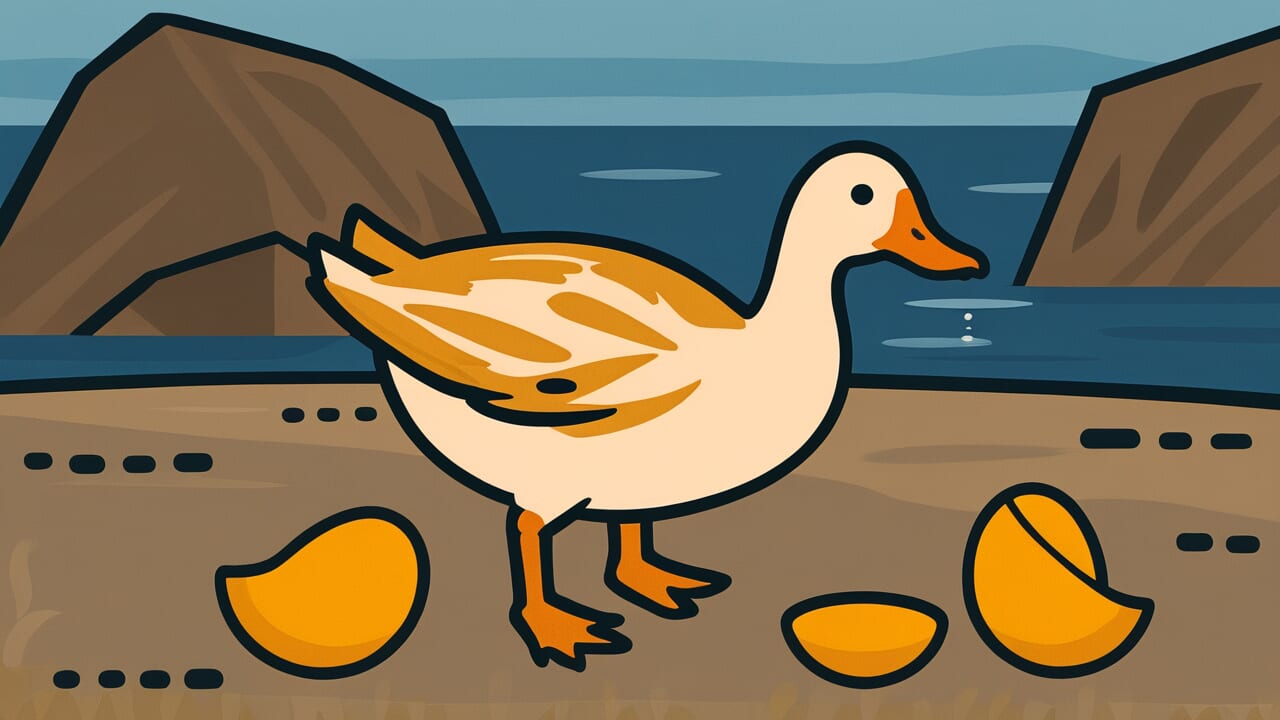How to Read “Don’t kill the goose that lays golden eggs”
Kin no tamago wo umu gachō wo korosu na
Meaning of “Don’t kill the goose that lays golden eggs”
This proverb teaches that you shouldn’t destroy your source of future profit by chasing immediate gains. It warns against the foolishness of ruining something that reliably brings you benefits every day.
You might rush to get more profit faster and end up destroying the very source of that profit. This is the danger the proverb highlights.
In business, this applies to several situations. Making excessive demands on good customers and ruining relationships is one example. Overworking talented employees until they burn out is another.
It also describes depleting environmental resources through overexploitation. In personal life, it can mean sacrificing your health by working too hard.
Or it might mean losing trust by demanding too much from others in relationships. The proverb uses a striking metaphor to emphasize the importance of long-term thinking.
Origin and Etymology
This proverb comes from a story by Aesop, the ancient Greek fable writer. A farmer owned a goose that laid one golden egg every day.
At first the farmer was happy. But gradually his greed grew stronger. He thought the goose’s belly must be full of golden eggs.
He decided to get them all at once. So he killed the goose and cut it open. Inside, it was just like any ordinary goose.
He ended up losing the precious goose that had been laying golden eggs every day.
This fable spread around the world. In Japan, it was introduced as a Western moral tale after the Meiji era began.
Aesop’s Fables were translated many times as educational books for children. Through these translations, this story became established as a lesson about losing everything through excessive greed.
The goose was chosen because it was a familiar domestic bird in Europe. People had raised geese as livestock since ancient times.
The contrast between the unrealistic golden eggs and human foolishness that ruins them makes this fable memorable.
Interesting Facts
In the original Aesop’s Fables, it appears as “the goose that laid golden eggs.” In English, the expression “Kill the goose that lays the golden eggs” has become established worldwide as a business term.
Economics textbooks frequently cite it as an example when explaining the importance of sustainability.
Geese actually lay only one egg at a time. But their eggs are larger and more nutritious than chicken eggs.
Geese have been carefully raised as valuable livestock since ancient Roman times. This high value of geese likely influenced their selection as the subject of this fable.
Usage Examples
- This company makes excellent employees work for low wages. I want to tell them “Don’t kill the goose that lays golden eggs.”
- Clear-cutting forest resources to pursue short-term profit is exactly like killing the goose that lays golden eggs.
Universal Wisdom
Humans have an impulse to “get everything right now.” This proverb has been passed down for thousands of years because it strikes at this fundamental human weakness.
Small daily gains feel ordinary precisely because they’re reliable. Eventually we stop feeling grateful for them. Then the desire for “more and faster” raises its head.
This psychology never changes across time. The moment the farmer cut open the goose’s belly is the same as when modern people max out their credit cards.
It’s the same as when companies betray customer trust for short-term profit. The same human nature is at work.
What’s interesting is that people only realize value after losing it. The farmer didn’t notice how precious the goose was while it laid golden eggs daily.
He only felt it keenly after killing it. This structure of regret is universal too. Health, relationships, natural environment—we realize “those were good times” only after losing them.
This proverb brilliantly expresses the conflict between human short-term thinking and long-term perspective. It also teaches us that sustainability is actually wisdom humanity has tried to learn since ancient times.
When AI Hears This
Looking at a goose laying golden eggs through complexity science reveals this isn’t simple cause and effect. It’s a mechanism called “emergence.”
Emergence means new properties arise from the whole system that individual elements can’t explain. The goose as an organism continuously interacts with food and environment.
This produces unpredictable value—golden eggs—continuously. The word “continuously” is the crucial point here.
Killing the goose essentially means physically destroying this feedback loop. The act of obtaining existing eggs eliminates the very system that creates future eggs.
Complexity theory shows such systems have “irreversibility”—once broken, they can’t be restored. Even buying a new goose won’t reproduce the previous goose’s special abilities or environmental relationships.
What’s interesting is that human brains are wired to prioritize short-term benefits. When comparing certain immediate rewards with uncertain future rewards, brains react more strongly to the former.
Behavioral economics calls this “hyperbolic discounting.” That’s why many people choose to destroy emergent systems even when they understand the logic.
What this proverb really warns against is human cognitive bias itself.
Lessons for Today
What “Don’t kill the goose that lays golden eggs” teaches modern you is the attitude of “cherishing the source of value.” That might be skills and techniques at work.
It might be trust in relationships. Or it might be daily habits for health.
Modern society demands “faster and more.” But what truly matters are things that create value steadily, little by little, every day.
Don’t take them for granted. Maintaining gratitude is the first step.
Specifically, don’t ruin relationships with good customers for one big deal. Don’t sacrifice your health for short-term results. Treasure reliable friends.
When you feel rushed, stop and think. Ask yourself, “What am I about to kill right now?”
Your life surely has a goose laying golden eggs too. It may not be obvious, but it supports you every day.
Noticing that presence and carefully nurturing it is the path to a rich future.



Comments